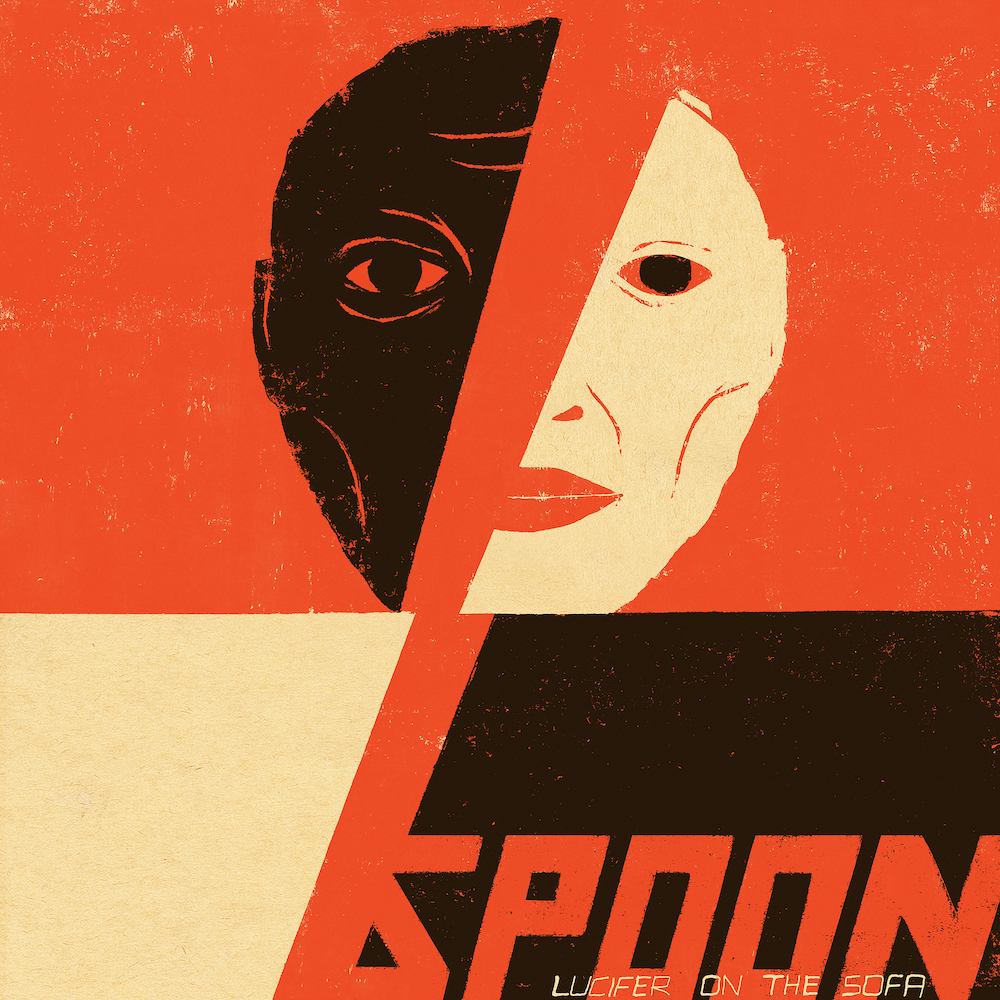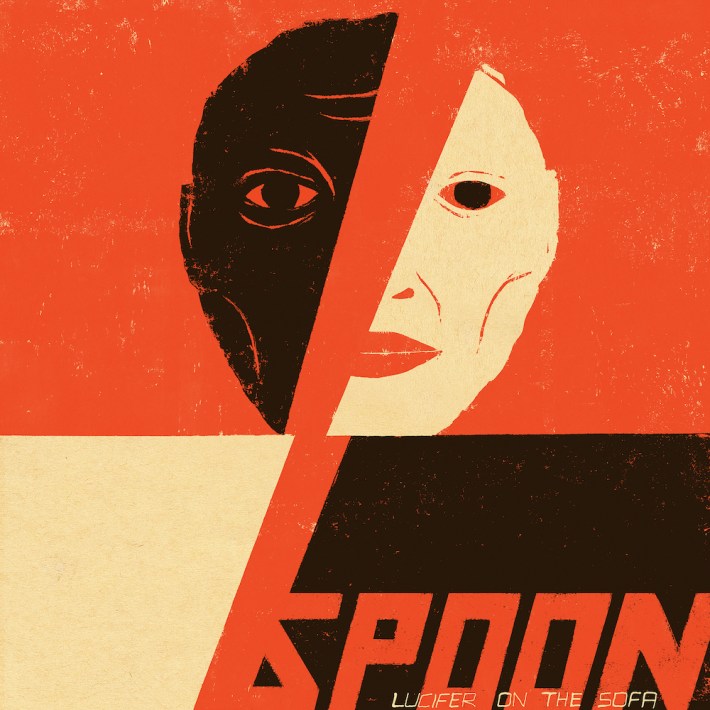- Matador
- 2022
It has been five long years since the last new Spoon album. That's their longest layoff between full-lengths to date, and the simple fact of time elapsed is enough to mark this project as the start of a new era for the band. And as long as Britt Daniel's been teasing the new Lucifer On The Sofa, he's very much talked up these songs as something different, a fresh chapter.
That would make sense in light of Spoon's history because up until now their career could be divided remarkably neatly by decade. In the '90s, they were a rangy indie-rock entity indebted to Pixies and Wire, inspired but still figuring out an identity of their own. After the '00s releases established and refined Spoon's unmistakable core sound, the '10s were something of a wandering experimental phase. The once-divisive but fan-beloved Transference took Spoon’s pristine formulae and dirtied them up, allowing songs to wheeze and collapse. But even in the ramshackle dust of that album, new textures and warped sounds were emerging in Spoon’s palette. That yielded They Want My Soul, perhaps the band’s poppiest album, the one where they lavished glimmering synths over bulletproof songwriting. Those art-rock tints got expanded all the way out on the melted David Bowie plastic of Hot Thoughts, a dance-y and synthetic collection that, in the context of Spoon and the weight of their reputation for "consistency," marked their most extreme left turn.
Hot Thoughts, perhaps inevitably, also became one of the more polarizing Spoon albums -- some felt it lost what really makes this band tick by trading their signature mechanistic perfection for a more warped aesthetic. Some, like me, loved hearing them go further into this zonked-out zone. Maybe the band members themselves fell somewhere in the middle. After touring the album longer than any of their previous releases, they’d found they preferred the live versions of the songs that had developed over time to the material on the album. This, amongst a host of other factors, set the stage for a complete change of approach and pace for what would become Lucifer On The Sofa, the first Spoon LP of the 2020s.
In the fall of 2019, Daniel moved back to Austin for the first time since the '00s. He wanted to make something simpler, direct. When I interviewed him in 2019, when Spoon were promoting their greatest hits collection, he remarked that the compilation’s new song "No Bullets Spent" was perhaps a preview of what was to come. "We keep calling it rock 'n' roll. I don’t know exactly what that means," he said of the new album at the time. More recently, he figured out what it meant. Upon the release of Lucifer On The Sofa's lead single "The Hardest Cut," Daniel characterized the album's aesthetic as "the sound of classic rock as written by a guy who never did get Eric Clapton" while mentioning he'd spent a good deal of 2018 and 2019 listening to ZZ Top. Perhaps this would be Spoon’s big swaggering riff album.
That’s what "The Hardest Cut" suggested. While still recognizable as a prototypical Spoon rocker, it also had a riff that managed to be razor-edged and swampy at once. The band called it the "Texas riff," and yes, whatever shit-kicking rock 'n' roll qualities Daniel communed with upon returning to his home state seemed to be very much seeping into Spoon’s new songs. With all its gnarled guitars, "The Hardest Cut" was a fitting opening salvo for a revitalized, no-nonsense, overdue return from Spoon.
Spiritually, that's still true, given that the song is one of three or four tracks from Lucifer On The Sofa that feel like instant Spoon classics. (The other contenders in my mind are "Wild," "On The Radio," and the title track, though I could also see the argument for "My Babe.") Lucifer On The Sofa, however, isn’t necessarily the sunglassed classic rock groover suggested by those ZZ Top namechecks. What you can more readily hear is one of the other threads the band has discussed during Lucifer's rollout. As a consequence of those realizations after touring Hot Thoughts, one of the other goals going into its successor was to replicate that road-testing, that Spoon precision via careful editing, in lieu of the experimental layering that defined Hot Thoughts. In a recent Pitchfork interview, Daniel discussed a desire to capture the sound and feel of Spoon playing live in a room. Accordingly, the songs were worked over and pared down yet also somehow left messy.
As a result, Lucifer On The Sofa boasts a handful of songs that could've comfortably coexisted on plenty of past Spoon outings: "The Devil & Mister Jones," "On The Radio," and "Satellite" would all conceivably fit on any release between Kill The Moonlight and They Want My Soul. But given the harder style and the band's intended changes in approach, Lucifer On The Sofa has a lived-in, frayed-edge quality to it even at its prettiest moments -- and certainly to uglier ones like the album-opening cover of Smog's "Held," which begins with studio chatter and sends thunderous waves of noise rippling out over its pounding blues-rock groove. On the spectrum of Spoon albums, the new one most resembles hypothetical connective tissue between Transference's graininess and They Want My Soul, with its late-night atmospherics and unstoppable hooks.
At times, this feeling of various strains colliding results in something new. "Wild," surprisingly cowritten by pop and alternative super-producer Jack Antonoff, is so immediately unshakeable it feels like the sort of song Spoon should've already released many years ago, and yet it doesn’t feel quite like anything they’ve done before. Still tinged by the band’s often-sardonic worldview, it's also an unabashed anthem, with a Britpop piano lifting the chorus up into the clouds as Daniel sings about still finding wonder in the world around him. Along with "The Hardest Cut," "Wild" walks this funny line -- something that feels so endemically Spoon, but finds them subtly continuing to expand their well-stocked bag of songwriting tricks.
On the other side of that is the album's stunning title track and closer. "Lucifer On The Sofa" is all smoke tendrils and blurred neon lights at night in the city, and it's one of the keys to the whole album. Daniel has referenced it, somewhat obliquely, as being about him trying to get over the worst parts of himself. He sings it almost addressed to himself: What are you going to do with your last cigarettes and old records, you're drifting down once familiar streets in Austin.
Part of that might come from Daniel relocating to a radically changed city many years later, but it also points to the part of Lucifer On The Sofa that germinated during the pandemic. Like the rest of us, Daniel saw places he passed through every day transformed in the eerie quiet of the early pandemic. Across the album, there are hints of that loneliness in quiet and haggard songs, countered by the renewal of a song like "Wild," or the earnestness of a love song like "My Babe," or the embrace of the simple yet otherworldly comfort that can be found in music (and the interior yet communal experience of it) in "On The Radio."
That means there’s a whole array of moods and images across Lucifer On The Sofa. Just like most Spoon albums, there isn't necessarily a unifying big idea or narrative, but a collection of impeccably crafted songs that, coming from journeyman favorites like Spoon, at first sound like old friends before you realize all the new things you’re hearing within them. While its ragged qualities can recall Transference, it's more like the transition from They Want My Soul to Hot Thoughts: the band refocusing on some core element of what they have always done best, but reorienting it in a slightly altered light. And on the other side of a five-year absence, it's a joy to hear Spoon tell that story.
Lucifer On The Sofa is out 2/11 on Matador.







